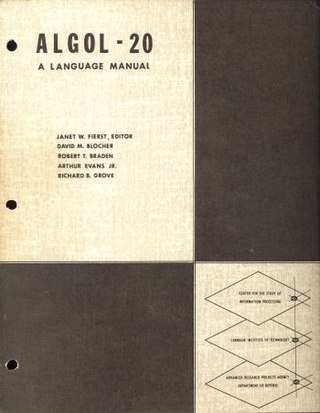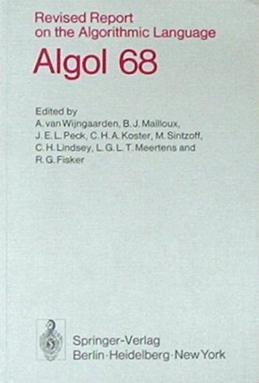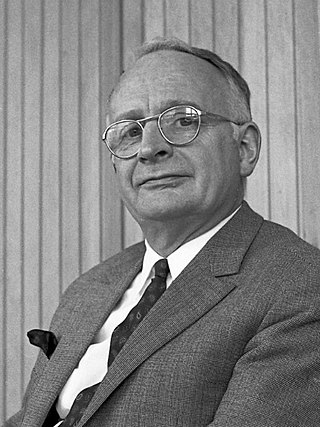
ALGOL is a family of imperative computer programming languages originally developed in 1958. ALGOL heavily influenced many other languages and was the standard method for algorithm description used by the Association for Computing Machinery (ACM) in textbooks and academic sources for more than thirty years.
ABC is an imperative general-purpose programming language and integrated development environment (IDE) developed at Centrum Wiskunde & Informatica (CWI), in Amsterdam, Netherlands by Leo Geurts, Lambert Meertens, and Steven Pemberton. It is interactive, structured, high-level, and intended to be used instead of BASIC, Pascal, or AWK. It is intended for teaching or prototyping, but not as a systems-programming language.
The Centrum Wiskunde & Informatica is a research centre in the field of mathematics and theoretical computer science. It is part of the institutes organization of the Dutch Research Council (NWO) and is located at the Amsterdam Science Park. This institute is famous as the creation site of the programming language Python. It was a founding member of the European Research Consortium for Informatics and Mathematics (ERCIM).
ALGOL 60 is a member of the ALGOL family of computer programming languages. It followed on from ALGOL 58 which had introduced code blocks and the begin and end pairs for delimiting them, representing a key advance in the rise of structured programming. ALGOL 60 was one of the first languages implementing function definitions. ALGOL 60 function definitions could be nested within one another, with lexical scope. It gave rise to many other languages, including CPL, PL/I, Simula, BCPL, B, Pascal, and C. Practically every computer of the era had a systems programming language based on ALGOL 60 concepts.

ALGOL 68 is an imperative programming language that was conceived as a successor to the ALGOL 60 programming language, designed with the goal of a much wider scope of application and more rigorously defined syntax and semantics.

Adriaan "Aad" van Wijngaarden was a Dutch mathematician and computer scientist. Trained as a mechanical engineer, Van Wijngaarden emphasized and promoted the mathematical aspects of computing, first in numerical analysis, then in programming languages and finally in design principles of such languages.
ALGOL X was the code name given to a programming language which was being developed as a successor to ALGOL 60, by the International Federation for Information Processing (IFIP) IFIP Working Group 2.1 on Algorithmic Languages and Calculi, which supports and maintains the languages ALGOL 60 and ALGOL 68. It attempted to find a "short-term solution to existing difficulties". ALGOL N and ALGOL W were two other ALGOL versions proposed to fulfill this need.
In computer science, a Van Wijngaarden grammar is a formalism for defining formal languages. The name derives from the formalism invented by Adriaan van Wijngaarden for the purpose of defining the ALGOL 68 programming language. The resulting specification remains its most notable application.
Barry James Mailloux obtained his Master of Science (M.Sc.) in numerical analysis in 1963. From 1966, he studied at Amsterdam's Mathematisch Centrum under Adriaan van Wijngaarden, earning a Doctor of Philosophy (Ph.D.) in 1968.

Cornelis Hermanus Antonius "Kees" Koster was a Dutch computer scientist who was a professor in the Department of Informatics at the Radboud University Nijmegen in the Netherlands.
FLACC is an implementation of the ALGOL 68 programming language.
Lambert Guillaume Louis Théodore Meertens or L.G.L.T. Meertens is a Dutch computer scientist and professor. As of 2020, he is a researcher at the Kestrel Institute, a nonprofit computer science research center in Palo Alto's Stanford Research Park.
The ARRA was the first Dutch computer, and was built from relays for the Dutch Mathematical Centre, which later became the Centrum Wiskunde & Informatica (CWI).
TSS/8 is a discontinued time-sharing operating system co-written by Don Witcraft and John Everett at Digital Equipment Corporation in 1967. DEC also referred to it as Timeshared-8 and later the EduSystem 50.
In computer programming, orthogonality means that operations change just one thing without affecting others. The term is most-frequently used regarding assembly instruction sets, as orthogonal instruction set.
Jan Hemelrijk was a Dutch mathematician, Professor of Statistics at the University of Amsterdam, and authority in the field of stochastic processes.
Gijsbert (Gijs) de Leve was a Dutch mathematician and operations researcher, known for his work on Markov decision process. Gijs de Leve is considered the founder of operations research in the Netherlands.

Reinder Pieter (Reind) van de Riet was a Dutch computer scientist and Emeritus Professor Information Systems at the Vrije Universiteit Amsterdam, known for the development of COLOR-X, a linguistically-based event modeling language for object modeling.
Hermann Bottenbruch was a German mathematician and computer scientist.
Jacobus Willem (Jaco) de Bakker was a Dutch theoretical computer scientist and professor at the Vrije Universiteit Amsterdam.




